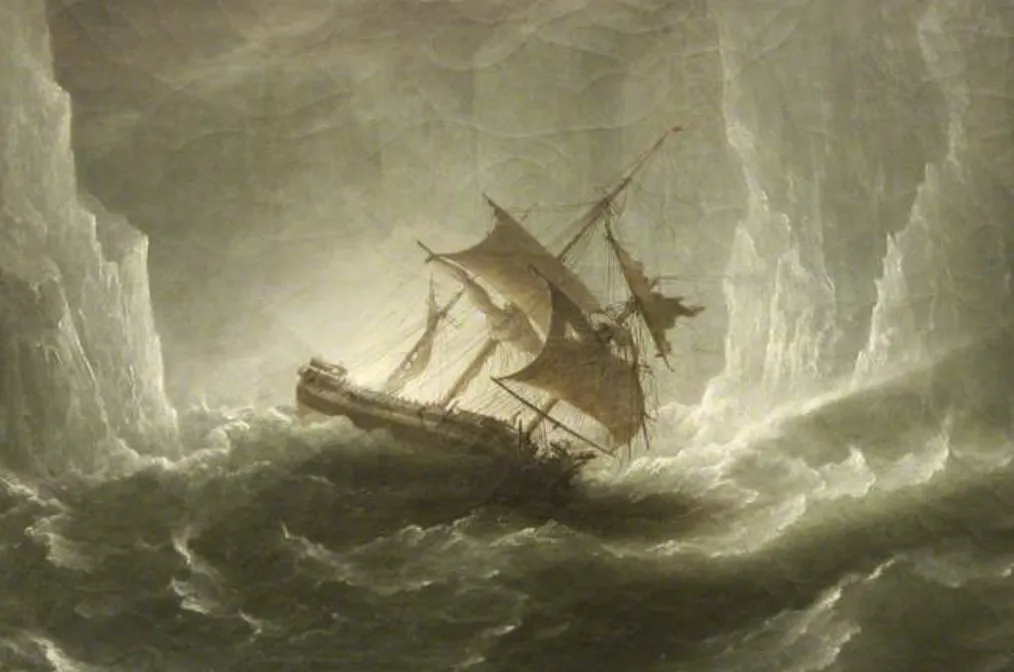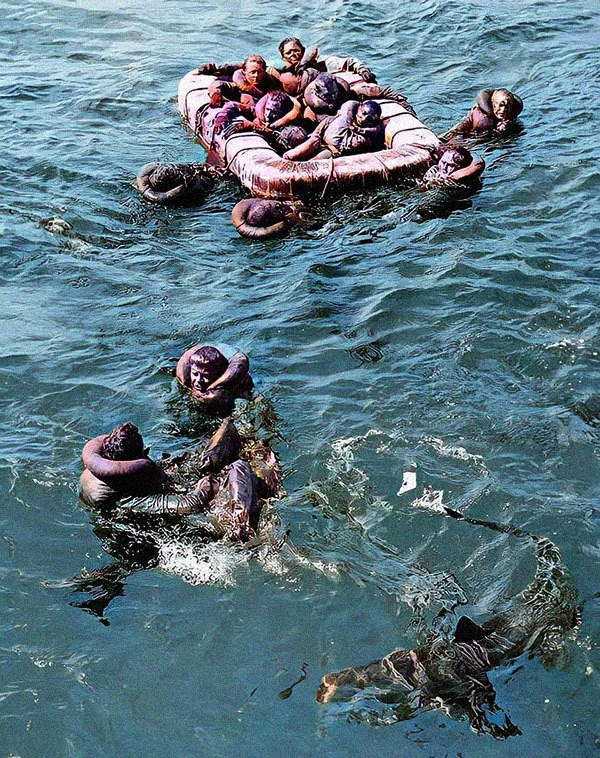The Chilling Mystery of the Ghost Ship Octavius: 13 Years Lost at Sea
The Eerie Discovery of the Ghost Ship Octavius
The legend of the Octavius is among the most haunting ghost ship tales in maritime history. Found adrift 13 years after its disappearance, this 18th-century ship was a chilling scene frozen in time. The entire crew was discovered, eerily preserved by the freezing Arctic climate, as if awaiting rescue that never came. The captain’s final log entry painted a grim picture of the ship’s last days, but questions still linger. Was it a tragedy caused by nature, or something more sinister?
The Octavius had embarked on a journey that many believed to be cursed. Sailing through the dangerous Northwest Passage, the ship fell into oblivion, only to be found over a decade later, still drifting across the frigid waters.
The Disappearance of the Octavius: Setting Sail for Fate

In 1761, the Octavius set sail from England, bound for China, a common trade route during the period. The ship’s journey was expected to take several months, and it seemed like just another routine voyage. However, something went terribly wrong. After completing its business in China, the Octavius attempted to make the hazardous trip back through the Northwest Passage — an ambitious and treacherous route known for its icy perils.
For 13 years, nothing was heard from the ship or its crew, leaving families, traders, and authorities in England to assume it had been lost at sea.
“The Arctic is unforgiving to those who attempt to traverse it without caution, especially in the 18th century. Ships like the Octavius had little chance against the icy labyrinth.” — Maritime Historian, Johnathan Reynolds.
Despite the time that passed, hope remained for the ship’s return. The cruel reality, however, would only come to light much later.
Frozen in Time: The State of the Crew
When the Octavius was finally discovered adrift by a whaling ship near Greenland, the scene onboard was both tragic and eerie. The entire crew had perished, frozen where they had sat, suggesting that the ship had been trapped in the ice for years. The captain was found at his desk, holding the ship’s log, his body preserved by the cold.
The ship’s cargo, incredibly, was intact. Among the most haunting discoveries was the captain’s final log entry, dated 1762, describing their position as they became hopelessly stuck in the icy waters of the Arctic. The Octavius had become a tomb, drifting aimlessly, while the world below continued on.
Theories Behind the Fate of the Octavius

The fate of the Octavius has fascinated historians, sailors, and supernatural enthusiasts alike. Some believe that the ship was simply a victim of the harsh conditions of the Northwest Passage. However, others are convinced that there are deeper, perhaps supernatural forces at play.
Natural Causes: Extreme Weather and Starvation
One theory posits that the Octavius was caught in an unexpected freeze, likely while attempting to navigate the treacherous Northwest Passage. The crew, unable to break free from the ice, eventually succumbed to the cold and starvation. The Arctic climate preserved their bodies, which is why they were found in such a lifelike state.
The captain’s log suggests that they made repeated attempts to free the ship but were thwarted by the thickening ice. Without the technology to navigate or survive such extreme environments, the Octavius and its crew were doomed.
Supernatural Theories: Cursed by the Sea
There is another, more haunting theory that surrounds the Octavius. Maritime lore is filled with tales of ghost ships and cursed vessels, and many believe that the Octavius was doomed by a curse. Perhaps it had angered the sea gods, or maybe it carried an item of supernatural significance that led to its crew’s demise.
Sailors have long whispered about ghost ships that appear and disappear, often bringing doom to those who encounter them. The Octavius fits neatly into this tradition, with its mysterious reappearance and the chilling state of its crew. Could it be that the ship was not simply trapped by the ice, but by something far more ominous?
Maritime Exploration in the 18th Century
To understand the story of the Octavius, it’s essential to explore the broader context of maritime exploration during the 18th century. The Northwest Passage was one of the most sought-after trade routes, and many ships attempted to traverse its icy waters to reach Asia more quickly. The economic incentives were enormous, as successfully navigating the passage would reduce travel time and bring wealth to those who could master the route.
However, this ambition came with deadly risks. Many ships became trapped in the ice, and few survived the journey. The Octavius was just one of the many that perished in the attempt, but its story has lingered far longer due to the chilling details of its discovery.
Ghost Ships in Maritime Lore: The Octavius and Beyond
The tale of the Octavius is just one of many ghost ship legends that have captured the public’s imagination. Ships like the Flying Dutchman, doomed to sail the seas for eternity, have been immortalized in books, films, and folklore. The Octavius, with its crew frozen in time, is another example of how maritime tragedies often blend with the supernatural in the popular consciousness.
The Flying Dutchman and Other Ghostly Vessels
Perhaps the most famous of all ghost ships is the Flying Dutchman, said to be doomed to sail the oceans forever after failing to round the Cape of Good Hope. Much like the Octavius, the Flying Dutchman has been the subject of numerous stories, often appearing to sailors as a bad omen. Similarly, the Mary Celeste is another ghost ship that was found adrift with no crew, leading to widespread speculation and fear.
Ghost ships have always fascinated sailors and land dwellers alike because they represent a link between the natural and supernatural worlds. The idea of a ship lost at sea, carrying its doomed crew into eternity, taps into deep-seated fears about the unknown and uncontrollable power of nature.
Legacy of the Octavius: Myth or Reality?
The story of the Octavius continues to captivate audiences, but is it true, or is it just another maritime myth? There is no definitive evidence that the ship ever existed, leading some to argue that the tale is simply folklore. However, there are records from the period that suggest a ship fitting the Octavius’ description did disappear around the time in question.
Influence on Literature and Media
Whether or not the Octavius was real, its story has left a lasting impact on culture. From novels to documentaries, the tale of the ghost ship has been retold countless times, each version adding new layers to the legend. Ghost ships like the Octavius serve as powerful symbols of human frailty in the face of nature’s might.
Could the Octavius Really Exist?
While many doubt the existence of the Octavius, some believe that the ship may have been real. The Northwest Passage was a notoriously dangerous route, and ships often disappeared without a trace. It’s not out of the realm of possibility that the Octavius was one of these unfortunate vessels. However, without concrete evidence, it remains a mystery.
Table: Key Details of the Octavius Ship
| Detail | Description |
|---|---|
| Ship Name | Octavius |
| Last Known Voyage | 1761, England to China via Northwest Passage |
| Disappearance | Lost for 13 years |
| Crew Fate | Found frozen, adrift |
| Final Log Date | 1762 |
| Condition | Ship intact, crew frozen in place |
FAQ Section:
Q: What was the Octavius ship?
A: The Octavius was an 18th-century ship that was found adrift with its crew frozen after being lost for 13 years.
Q: How long was the Octavius lost at sea?
A: The Octavius was lost for 13 years before it was discovered by a whaling ship.
Q: Was the Octavius ship cursed?
A: Some believe the Octavius was cursed, while others think natural causes, such as the harsh Arctic conditions, led to its demise.
Q: Did the Octavius sail through the Northwest Passage?
A: Yes, the Octavius was attempting to sail through the Northwest Passage, which was a treacherous and often deadly route.
Q: Is the story of the Octavius true?
A: The existence of the Octavius has not been conclusively proven, and many view it as a maritime legend.
Meta Description:
Unveil the mystery of the ghost ship Octavius, adrift for 13 years. Was it cursed, or merely a victim of nature? Discover the truth behind this haunting tale.
References:
- https://www.historydefined.net/ghost-ship-octavius/
https://www.historydefined.net/ghost-ship-octavius/






